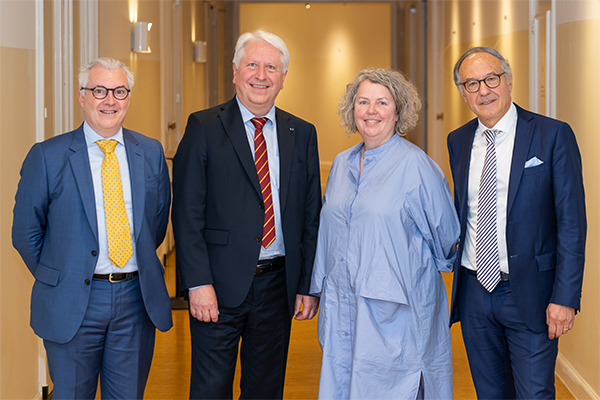LERU turns twenty and defends the role of research-intensive universities in a post-pandemic scenario

Last week, the League of European Research Universities (LERU) held a ceremony to commemorate its twenty years of existence. The chosen city to do so was Leiden, in the Netherlands, the place where the network was born in 2002. The University of Barcelona has been a member of LERU since 2010.
The field of higher education has many challenges, some of which were tackled during the two days of the twentieth anniversary conference. The opening counted on the presence of Maria Leptin, president of the European Research Council; Christian Ehler, member of the European Parliament, and Pavel Doleček, former deputy minister for Higher Education, Science and Research of the Czech Republic, among other speakers. Mariya Gabriel, commissioner for Innovation, Research, Culture and Education at the European Commission, took part in the meeting as well.

Last week, the League of European Research Universities (LERU) held a ceremony to commemorate its twenty years of existence. The chosen city to do so was Leiden, in the Netherlands, the place where the network was born in 2002. The University of Barcelona has been a member of LERU since 2010.
The field of higher education has many challenges, some of which were tackled during the two days of the twentieth anniversary conference. The opening counted on the presence of Maria Leptin, president of the European Research Council; Christian Ehler, member of the European Parliament, and Pavel Doleček, former deputy minister for Higher Education, Science and Research of the Czech Republic, among other speakers. Mariya Gabriel, commissioner for Innovation, Research, Culture and Education at the European Commission, took part in the meeting as well.
One of the topics that were debated was the need for ensuring the universitiesʼ freedom and autonomy, an essential aspect in a moment when civil rights are at stake. The war in Ukraine has shaken the European board, at the university and research level too. The attendants insisted on the importance of finding the balance between the need for public funding and the obligations it entails without limiting the freedom of the university.
The post-pandemic scenario was another main focus of attention. Specifically, they talked about how the universities accelerated their transformation processes since COVID-19, and about the importance of basic research as a first step to fight against diseases like COVID-19 and the need to strengthen open science in order to share results quickly.
Another topic was the transformation of research evaluation and the academic career in general. They proposed to expand the concept of excellence beyond the publication and research activity, adding the recognition of teaching quality, social impact and dissemination and leadership.
Finally, a document called Principles of Leiden, which identifies the role of the universities after he pandemic, was signed. The signatories were the international networks present in the meeting: LERU, U15-Group of Canadian Universities, the German U15, RU11 Japan and the Russell Group from UK.
The University of Barcelona is fully committed to the university autonomy and the need for more public resources. It also made a firm commitment to the open dissemination of research results aiming to speeding up the publication of results. At the same time, it started a process of transformation of the teaching model that goes beyond technological tools.
New LERU chair
Leiden University held a new edition of the LERU Rectorsʼ Assembly, in which Yves Flückiger, rector of the University of Geneva, was elected new chair of the network. The vice-rector for Research of the University of Barcelona, Jordi García, was recently appointed member of the LERU Research Policy Group.
